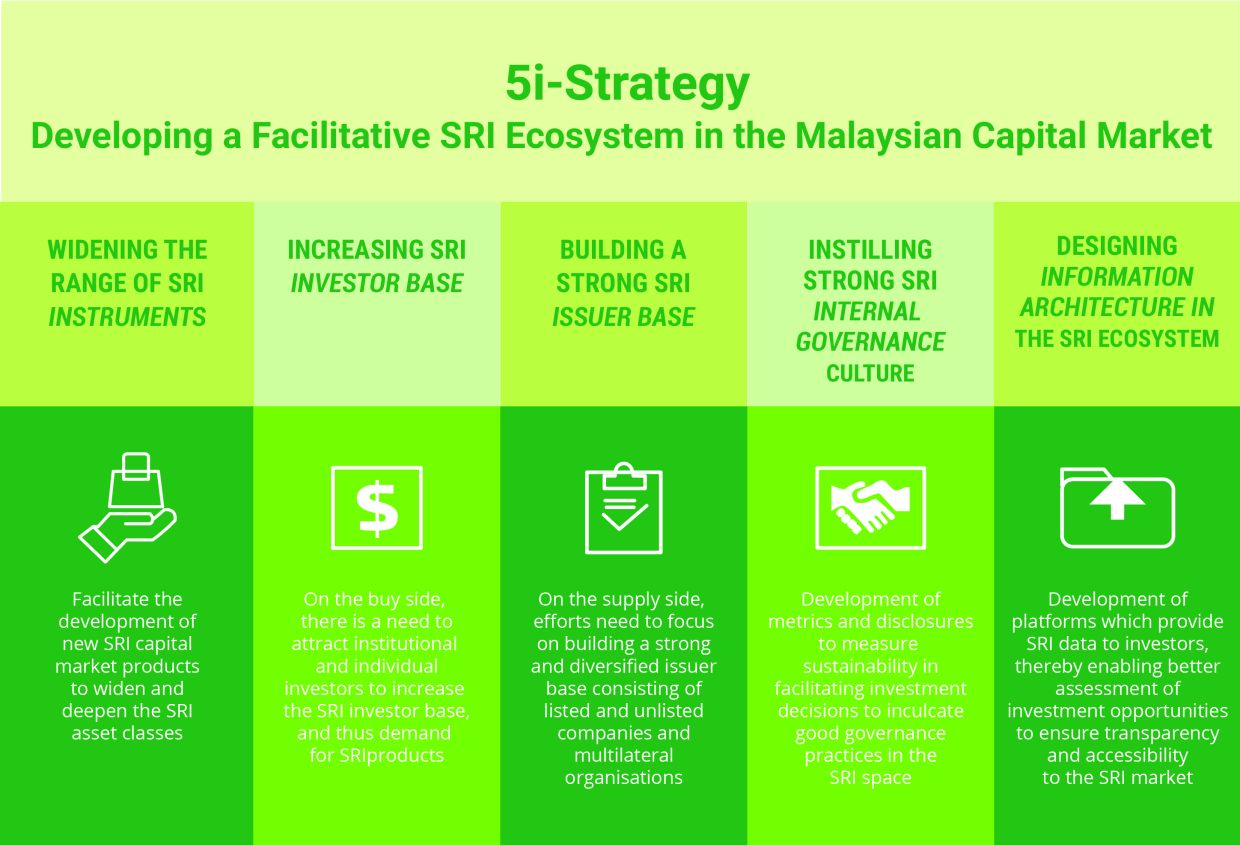
BIX ARTICLE
Supporting the ESG Agenda for SMEs
Sep 29, 2023
|
5 min read
Featured Posts
SRI Sukuk: The Journey Towards Sustainable and Responsible Investment
Jul 23, 2020
|
5 min read
Securities Commission's Capital Market Masterplan 3 (CMP3)
Sep 21, 2021
|
2 min read
What If We Allowed Retail Investors to Directly Invest in Malaysia’s Government Bond?
Aug 24, 2021
|
8 min read
Islamic Bonds Come Under Microscope After Garuda Indonesia Default
Aug 19, 2021
|
8 min read
 Datuk Kamarudin Hashim is the Securities Commission Malaysia managing director and co-chair of the Joint Committee on Climate Change (JC3).
Datuk Kamarudin Hashim is the Securities Commission Malaysia managing director and co-chair of the Joint Committee on Climate Change (JC3).Small and medium-sized enterprises (SMEs) wield significant influence in shaping the future of the domestic and global economy. In Malaysia, SMEs are the backbone of the economy. More than 97% of all businesses are SMEs, contributing to over 38% to GDP and employing 48.2% of the workforce. These remarkable statistics show that SMEs are a major catalyst in our nation’s sustainability agenda.
Some SMEs are integral part of supply chains which has led to growing pressure for them to incorporate environmental, social and governance (ESG) considerations into their business.
We are also seeing a growing call for SMEs to demonstrate greater environmental stewardship and social responsibility, driven by the expectations of their customers and suppliers. Today, the business case for sustainable operations is much stronger than ever and will become more intense over time.
The role of SMEs has been afforded greater significance, when our Prime Minister, at the recent announcement of the Ekonomi Madani, called for the internationalisation of SMEs. To become one, incorporating ESG into their business will inevitably be non-negotiable.
The Malaysian capital market serves as a pivotal platform to enable SMEs’ transition towards implementing sustainable practices.
The Securities Commission Malaysia (SC) paved the way for ESG development when Sustainable and Responsible Investment (SRI) was identified as a key growth strategy in the SC’s Capital Market Masterplan 2 (CMP2) launched in 2011.
This was an organic move since Malaysia is a global leader in Islamic finance. Notably, Islamic finance and sustainability share common values. Hence, developing the SRI segment was a natural step for the country.
Continuing on from the seed that was planted under the CMP2, the strategic initiatives under the Capital Market Masterplan 3 that was introduced in 2021, include enabling greater fund flows to all businesses of all sizes and at stages of growth, as well as enabling greater capital mobilisation to businesses that create value for various economic stakeholders.
 Green silhouette city landscape and forest abstract background.Nature and environment conservation concept flat design.Vector illustration.
Green silhouette city landscape and forest abstract background.Nature and environment conservation concept flat design.Vector illustration.Market response has been positive. As of 2022, SRI sukuk issuances total RM18.9bil since the SRI Sukuk Framework’s inception in 2014. There are also more SRI sukuk issuances this year related to renewable energy projects and green building.Since the introduction of the Guidelines on SRI Funds in 2017, the Malaysian SRI funds sector has expanded to RM7.1bil Net Asset Value (NAV) with 58 SRI funds as of December 2022.
Last year, the SC launched the SRI-Linked Sukuk Framework to help companies, especially in hard-to-abate sectors, to raise funds using sukuk structure with features related to the issuer's sustainability performance commitments.
The initiatives, help create a conducive environment for SMEs to transition, and builds on the earlier work done by the SC and the execution of the SC’s “5i strategy”. To ‘sync instead of swim’, SMEs will require multistakeholder effort and ecosystem wide enablers, from deepening awareness and understanding of sustainability risks and opportunities, to enabling access to financing and supporting capacity building.
Innovations in modern financing
In Malaysia, green and social projects are mainly funded through bank loans and bonds or sukuk. However, in practice, few SMEs have the capacity to raise financing through these channels.
Modern financing solutions such as the equity crowdfunding (ECF) and peer-to-peer (P2P) financing platforms have great potential to address this issue. These innovative avenues can help to connect SMEs with more investors by enabling cheaper, faster and more convenient financing options.
Today, MSMEs are increasingly using digital modes to secure capital and financing. In total and up to June 2023, ECF and P2P financing has helped 9,415 MSMEs raise about RM5.4bil. Throughout the years, we have seen MSMEs involved in green businesses successfully raise funds on ECF platforms.
Capacity building is essential
Most SMEs believe that strengthening ESG practices can increase business potential and long-term value. However, only 28% of SMEs have adopted some elements of ESG practices. More needs to be done to increase the awareness among SMEs.
Capacity building is key to achieve this goal. One of the SC’s measures on this front is the collaboration with Capital Markets Malaysia (CMM) on the NaviGate series which started in 2021. This initiative aims to promote greater awareness on sustainable capital market financing opportunities. The effort also provides greater business-capital connectivity, fostering a symbiotic relationship that supports economic growth and prosperity. Through the NaviGate series and other events, the SC and CMM have successfully engaged more than 1,000 SMEs.
The SC has also featured sustainability in its InvestSmart events, which promotes investment awareness and literacy. The SME Focus Group under the Joint Committee on Climate Change (JC3), is also a testament to the collective commitment to raise SME awareness and action on sustainability.
Empowering SMEs: Driving sustainable growth through capital markets
The ecosystem is in place and is being continuously strengthened and refined to support our ambitions of a just and sustainable transition. No market or business is immune to the global shift towards sustainable business, consumption and growth.
SMEs’ participation in value chains, access to finance and competitiveness will increasingly depend on their ability to measure, report and improve their sustainability performance.
Disclaimer
The information provided in this report is of a general nature and has been prepared for information purposes only. It is not intended to constitute research or as advice for any investor. The information in this report is not and should not be construed or considered as an offer, recommendation or solicitation for investments. Investors are advised to make their own independent evaluation of the information contained in this report, consider their own individual investment objectives, financial situation and particular needs and should seek appropriate personalised financial advice from a qualified professional to suit individual circumstances and risk profile.
The information contained in this report is prepared from data believed to be correct and reliable at the time of issuance of this report. While every effort is made to ensure the information is up-to-date and correct, Bond and Sukuk Information Platform Sdn Bhd (“the Company”) does not make any guarantee, representation or warranty, express or implied, as to the adequacy, accuracy, completeness, reliability or fairness of any such information contained in this report and accordingly, neither the Company nor any of its affiliates nor its related persons shall not be liable in any manner whatsoever for any consequences (including but not limited to any direct, indirect or consequential losses, loss of profits and damages) of any reliance thereon or usage thereof.
YOU MAY ALSO LIKE
ARTICLE
Jan 22, 2025
|
3 min read
ARTICLE
Jan 13, 2025
|
4 min read
ARTICLE
Dec 30, 2024
|
8 min read
ARTICLE
Nov 27, 2024
|
3 min read


